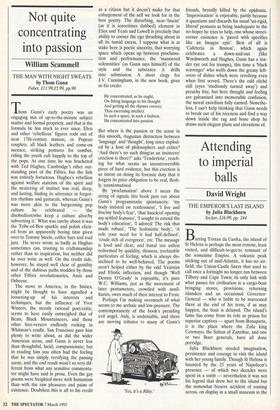Not quite concentrating into passion
William Scammell
THE MAN WITH NIGHT SWEATS by Thom Gunn Faber, £11.99,5.99, pp.90 Tom Gunn's early poetry was an engaging mix of up-to-the-minute subject matter and formal propriety, and that is the formula he has stuck to ever since. Elvis and other 'rebellious' figures rode out of neat 17th-century stanzas, or Popean couplets, all black leathers and come-on menace, striking postures for combat, riding the youth cult happily to the top of the pops. At one time he was bracketed with Ted Hughes, Cambridge's other out- standing poet of the Fifties, but the link was entirely fortuitous. Hughes's rebellion against welfare stateism of the spirit and the neutering of instinct was real, deep, and lasting, finding its utterance in forgot- ten rhythms and gutturals, whereas Gunn's was more akin to the burgeoning pop culture he celebrated — 'the disobedient/who keep a culture alive/by subverting it.' What was catchy about it was the Tribe-of-Ben sparkle and polish elicit- ed from an apparently boring time given over to Tommy Steele, coffee bars and trad jazz. He never wrote as badly as Hughes sometimes can, trusting to craftsmanship rather than to inspiration, but neither did he ever write as well. On the credit side, however, he stayed well clear of gentility and of the dubious paths trodden by those other Fifties revolutionaries, Amis and Osborne.
The move to America, in the Sixties, might be thought to have signalled a loosening-up of his interests and techniques, but the influence of Yvor Winters, the sternly rational poet-critic, seems to have easily outweighed that of Beats, Black Mountaineers, and those other free-versers endlessly rocking in Whitman's cradle. San Francisco gave him plenty to write about, as did the wider American scene, and Gunn is never less than thoughtful, lucid, compassionate; but in reading him you often had the feeling that he was simply versifying the passing scene, and the end result wasn't so very dif- ferent from what any sensitive commenta- tor might have said in prose. Even the gay poems were freighted more with humanism than with the raw pleasures and pains of existence. Doubtless this is all to his credit as a citizen but it doesn't make for that enlargement of the self we look for in the best poetry. The disturbing, near-'fascist' (as it is sometimes dubbed) element in Eliot and Yeats and Lowell is precisely that ability to corner the ego thrashing about in all its tumid excess. I suppose what is at stake here is poetic sincerity, that worrying space which opens up between proclama- tion and performance, the 'mannered solemnities' (as Gunn says himself) of the style and the substance it drills into submission. A short elegy for J.V. Cunningham, in the new book, gives us his credo:
He concentrated, as he ought, On fitting language to his thought And getting all the rhymes correct, Thus exercising intellect In such a space, in such a fashion, He concentrated into passion.
But where is the passion or the sense in this smooth, Augustan distinction between 'language' and 'thought', long since explod- ed by a host of philosophers and critics? 'And there's no such thing/as an insincere/ erection is there?' asks 'Tenderloin', reach- ing for what seems an incontrovertible piece of hard evidence, but this erection is so intent on doing its forensic duty that it forgets its prior obligation to be real, flesh- ly, unaxiomatised.
By 'proclamation' above I mean the string of signals this book puts out about Gunn's programmatic spontaneity: 'my body insisted on restlessness', 'I live and live/my body's fear', 'that knack/of opening my settled features', 'I sought to extend the body's education', 'I adored/ The risk that made robust', 'The hedonistic body', 'A role your need for it had half-defined', 'crude itch of evergreen', etc. The message is loud and clear, and banal too unless redeemed by quiddity, thisness, irrefutable particulars of feeling, which is always dis- inclined to be well-behaved. The poems aren't helped either by the odd Yeatsian and Eliotic inflection, and though 'Well Dennis O'Grady' is enjoyable, it's pure W.C. Williams, just as the movement of later pentameters, crowded with auxil- Hades, owes much of their interest to Frost.
Perhaps I'm making overmuch of what seems to me archaic and low-pressure. The contemporaneity of the book's presiding evil angel, Aids, is undeniable, and there are moving tributes to many of Gunn's 'Yes, it's a Riley.' friends, brutally killed by the epidemic. 'Improvisation' is enjoyable, partly because it questions and discards his usual 'un-rigid, liberal' postures as being inadequate to the no-hoper he tries to help, one whose street- corner existence is 'paved with specifics like an Imagist epic'. Best of all is 'Cafeteria in Boston', which again celebrates a down-and-out (like Wordsworth and Hughes, Gunn has a ten- der eye out for tramps), this time a 'black scavenger' who wolfs down the greasy left- overs of dishes which were revolting even when first served. There's the odd cliché still (eyes 'studiously turned away') and preachy line, but here thought and feeling are galvanised into memorable confusion, the moral exordium fully earned. Nonethe- less, I can't help thinking that Gunn needs to break out of his niceness and find a way down inside the rag and bone shop he draws such elegant plans and elevations of.


















































 Previous page
Previous page